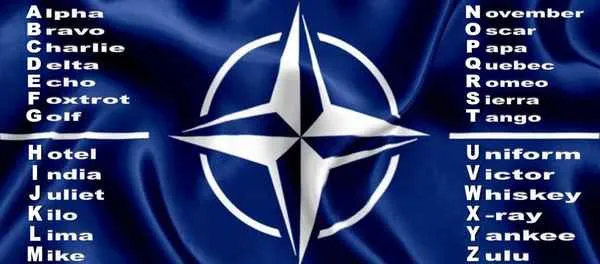Military Alphabet
The NATO Military Alphabet is a phonetic alphabet used globally for clear phonetic communication of the english language. The phonetic alphabet list is each of the 26 Alphabetic Characters of the English Language, plus the decimal digits, coded by a word and pronunciation that is clearly distinguishable in sound from other code word and number sounds. Originally devised for clear verbal communication by radio, the military alphabet is globally used by Militaries, Aviation and in General applications. The code words have varied over time but in 1956, NATO introduced a final modification which became the international standard.

The Military Alphabet
| Alphanumeric Character | Code Word | Phonetic Pronunciation |
|---|---|---|
| A | Alpha | AL fah |
| B | Bravo | BRAH voh |
| C | Charlie | CHAR lee |
| D | Delta | DEL tah |
| E | Echo | EKK oh |
| F | Foxtrot | FOKS trot |
| G | Golf | Golf |
| H | Hotel | HO tell |
| I | India | IN dee ah |
| J | Juliet | JEW lee ett |
| K | Kilo | KEY loh |
| L | Lima | LEE mah |
| M | Mike | Mike |
| N | November | NOH vem ber |
| O | Oscar | OSS car |
| P | Papa | PAH pah |
| Q | Quebec | keh BECK |
| R | Romeo | ROW me oh |
| S | Sierra | see AIR ah |
| T | Tango | TANG go |
| U | Uniform | YOU nee form |
| V | Victor | VIK ter |
| W | Whiskey | WISS key |
| X | X-ray | EKS ray |
| Y | Yankee | YANG kee |
| Z | Zulu | ZOO luu |
| 0 | Zero | ZE-RO |
| 1 | One | WUN Won (US Marine Corps) |
| 2 | Two | TOO |
| 3 | Three | TREE |
| 4 | Four | FOW-ER |
| 5 | Five | FIFE |
| 6 | Six | SIX |
| 7 | Seven | SEV-EN |
| 8 | Eight | AIT |
| 9 | Nine | NIN-ER |
| 00 | Hundred | HUN dred |
| 000 | Thousand | FOW sand |
| . decimal point | Decimal | DE SI mal |
| . full-stop period | Stop | STOP |
| - | Dash | DASH Tack (US Navy) |
 NATO Phonetic Alphabet FAQ
NATO Phonetic Alphabet FAQ
- Why the Military Alphabet?
- The alphabet in military code was developed in the 1950s to be intelligible and pronounceable to all NATO allies in the heat of battle. The clarity of communication and the use of easily learnable words taught by the Military Alphabet Chart led to its global adoption in the following years.
- Why is the NATO Military Alphabet Global?
- While other phonetic or more correctly, spelling alphabets, existed since the invention of radio communication, during the Second World War (1939 through 1944) more than 70 million people were enlisted in the military under the Allied and Axis Countries. Every troop's basic training included proficiency in the NATO Phonetic Alphabet. Moreover, the support and administration staff supporting the militaries and governments of this time also became proficient. It is therefore safe to say that more than 10% of the world population were fluently utilizing the NATO Spelling alphabet in their daily lives come 1944 regardless of their primary language and it developed into habit. There have only been minor modifications and clarifications since that time in the military codes for the alphabet.
- What other Names does the NATO Alphabet have?
- The NATO Phonetic Alphabet is not technically a Phonetic Alphabet. It is a spelling alphabet which is also known as a Radio Alphabet, the Military Alphabet, the Army Alphabet, ICAO (International Civil Aviation Organization) Code, Radiotelephony Alphabet or International Telecommunication Union (ICU) Alphabet. Each "version" of these spelling alphabets has slight deviation, but as of 2022, the alphabets are almost all identical.
- Do Countries have their own Phonetic Alphabets?
- Yes, there are country, regional and language specific phonetic alphabets. The English Language is still the international standard for the Financial, Aviation and Military communities so the NATO Phonetic Alhpabet is by far the widest used. For example, the US Financial Alphabet, the Spanish Phonetic Alphabet and the French Phonetic Alphabet.
- NATO Number Pronuniciation
- To avoid confusion when communicating, the Military Alphabet dictates that some numerals are pronounced differently to aid in the precision of communication:
- How is the number 3 pronounced on the radio?
- NATO's pronunciation of numeric 3 is tree (tri) to distinguish it from the word "free"
- How is the number 4 pronounced on the radio?
- NATO's pronunciation of numeric 4 is fow-er to distinguish it from the word "for"
- How is the number 5 pronounced on the radio?
- NATO's pronunciation of numeric 5 is fife to distinguish it from the word "fire"
- How is the number 9 pronounced on the radio?
- NATO's pronunciation of numeric 9 is nine-er to distinguish it from the number "five"
